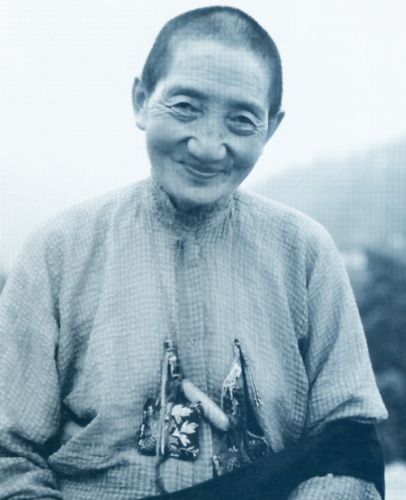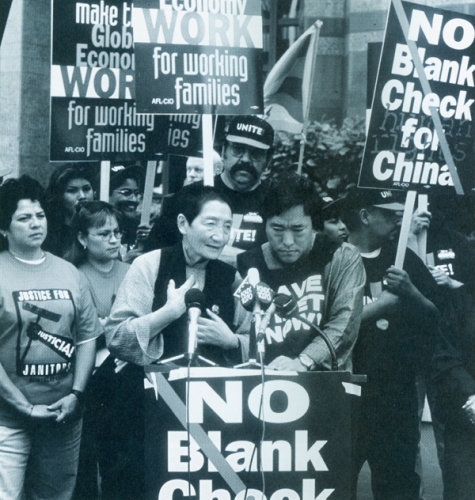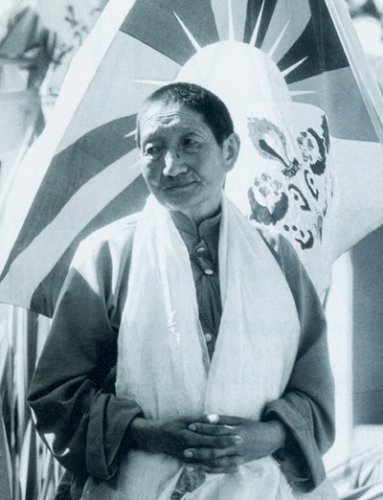
Ani Pachen Dolma, the Tibetan nun made legendary for her leadership in resistance to the Chinese occupation of Tibet and for her subsequent twenty-one-year imprisonment, died of heart failure at her home in Dharamsala, India, on February 2, 2002. She was sixty-nine years old.
The only child of a powerful Tibetan chieftain, Ani Pachen was training to become a nun in 1950 when the Chinese invaded Tibet. In 1958, after the death of her father, she left her spiritual practice to take his place, leading her people into the hills in a guerilla campaign against the Chinese invaders.
After months of struggle, narrow escapes, and hardship, Ani Pachen was captured. Over the next two decades she was held in some of the harshest Chinese prisons in Tibet. During the course of her imprisonment, she was shackled for over a year, confined for nine months in an underground cell, and repeatedly interrogated and beaten. Despite the torture she endured at the hands of her captors (with her arms tied behind her back, she was hoisted into the air by her wrists, then beaten until her shoulders were dislocated), Ani Pachen never lost her commitment to Buddhist practice. During her nine-month confinement underground, she completed one hundred thousand prostrations, and throughout her imprisonment, she followed the Tibetan Buddhist practice of tonglen, asking to take on the suffering of others. “Let me be the one to suffer, instead of them,” she often prayed.

In 1981, during an easing of tensions between the Tibetans and the Chinese, many prisoners were released, among them Ani Pachen. Finding her home destroyed and her family lost, she remained in Lhasa, where she helped to organize the first peaceful demonstrations against the Chinese occupation. In 1988, in danger of being rearrested for her efforts, she fled on foot over the Himalayas into Nepal. In 1989 she arrived in Dharamsala and there fulfilled her lifelong dream of meeting the Dalai Lama.
In 2000 Ani Pachen came to the United States for the publication of her life story, Sorrow Mountain: The Journey of a Tibetan Warrior Nun. Although her years of imprisonment had begun to take a toll on her health, her spirit never wavered. “My mission is to tell the world about what is happening in Tibet,” she said.
Over the remaining years of her life, Ani Pachen took part in Tibetan freedom marches in the United States, France, Italy, and Switzerland. She spoke out whenever she could—to the U.S. Congress, to other foreign governments, to individuals on the street. “As for me,” she wrote at the end of Sorrow Mountain, “the story will go like this: �She led her people to fight against the Chinese. She was present at the protests in Lhasa. She worked to save the ancient spiritual teachings.’ When I die, just my story will be left.”
“Life is impermanent,” she often remarked, “like lightning in the sky, like dewdrops on the grass. Our loved ones and our wealth last only a fleeting moment. The only changeless truths are the teachings of Buddha.”

In solitary isolation, when I wasn’t praying and prostrating, I was depressed. When I wasn’t depressed, I was angry. To deal with the anger, I began to visualize.
I remembered Gyalsay Rinpoche’s words: “There is no distinction between friend and foe. It is important to treat them the same. Your enemy is your teacher.”
I visualized my father on my right side, my mother on my left, and our great enemy, Chairman Mao Tse-tung, in front of me. My father was there to give me strength and courage, my mother to give me tenderness and caring. Mao Tse-tung was there because in all the world, I could think of no one more sinful. He had caused thousands of temples to be destroyed through his policies; thousands of lamas lost their lives. Tens of thousands of Tibetans had been starved, beaten, killed. What huge karmic sin he gathered to act as he did. With him before me, I prayed for his sins to be cleared. But I was never able to be free of my anger; as soon as I stopped, it came back.
—Ani Pachen
From Sorrow Mountain: The Journey of a Tibetan Warrior Nun, © 2000 by Ani Pachen amd Adelaide Donnelley, Published by Kodansha America. ▼
Thank you for subscribing to Tricycle! As a nonprofit, we depend on readers like you to keep Buddhist teachings and practices widely available.